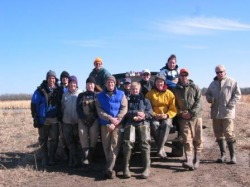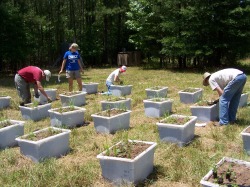Opportunities for Research in the Lab
Summer Field Technicians: We also typically hire summer research assistants to help with field and lab work. Look for ads posted here and on the Ecolog listserv (a great resource for ecology jobs)
Independent Research Opportunities: If you are interested in a more in-depth research experience (such as independent study credit or completing an honors thesis) please send Emily a detailed description of the kinds of research experience you hope to gain and tell her why you think the Bernhardt lab is the right place for you to accomplish those goals.
Graduate Research Opportunities - an open letter from Emily
Thanks for your interest in my lab. Here is some information to help you with the whether, the where, and the how of choosing and applying to graduate school.
Maybe the best information of all is this article written by 15 lab PhD and postdoc alumni --> At the interfaces of the hydrologic sciences: Connecting water, elements, ecosystems, and people through the major contributions of Dr. Emily Bernhardt (link to pdf)
First, have you thought this through?
Are you really ready to begin the 5-6 year process of earning a PhD? As a graduate student you can look forward to nearly nonstop (some might say relentless) intellectual stimulation and you will have opportunities to work with really smart people in very interesting places. Its important to be aware that these benefits do not come cheap, you won't get rich in graduate school and the job market for new PhDs is tough. So you have to love the process.
Second, is my lab the right place for your dissertation research?
I am always looking for bright, creative, motivated and collaborative students with a keen interest in biogeochemistry to join my group. You can read about our current research projects, but our lab is willing and able to expand into new territory if the questions are compelling. To determine if you are a good fit for the lab, I encourage you to consider the following:
- Are you willing to spend much of the next five years of your life either collecting field samples or performing analytical chemistry?
- Do you desire nearly limitless opportunities to discuss the cycling of N, P, C, [insert element of choice here] with similarly minded folks?
- Do you have a burning desire to understand how human activities are changing the sources and fates of biogeochemical elements?
- Can you read at least 3 publications from our lab publications page at one sitting and find yourself more awake than when you started?
If you answer yes to at least 3 of the questions above, you may very well be a good fit within our lab. To help me make this assessment, please send me the following information: 1) a detailed statement of why you want to attend graduate school and why my lab seems to be a good fit for you; 2) a description of your previous research experience; and 3) the names and institutions of the people who will provide your letters of recommendation.
As you are comparing potential graduate mentors, ask them about their mentoring philosophy. Here's mine in brief. It is an honor and a great responsibility to have a talented student choose you as a graduate mentor. My job as a mentor is to help my students find their research passions, focus their enthusiasms productively and ultimately to help them fulfill their individual career goals. In return, I expect my students to teach me new things and to inspire me to ask new questions. I do not like to bring students into PhD research on funded projects as research assistants because I believe it is critically important that a student choose their own questions and forge their own research trajectory. I prefer to help find the funds and the intellectual networks that can help students pursue the questions that inspire them. My lab group is a team of likeminded scientists who both push and help one another to do the best possible research and I expect all members of my lab group to both offer and accept constructive criticism and assistance.
If you decide to apply to Duke, I can accept PhD students through Duke's Department of Biology. Many of my students affiliate with the University Program in Ecology. See Duke's graduate school web page for the most up to date information about application deadlines and requirements. Our graduate program invites highly ranked candidates (=plenty of research experience, strong academic training, and a good fit with potential advisor) to interview in person in early Spring. Admissions decisions are made by a committee of graduate faculty within the department.
-Emily Bernhardt


